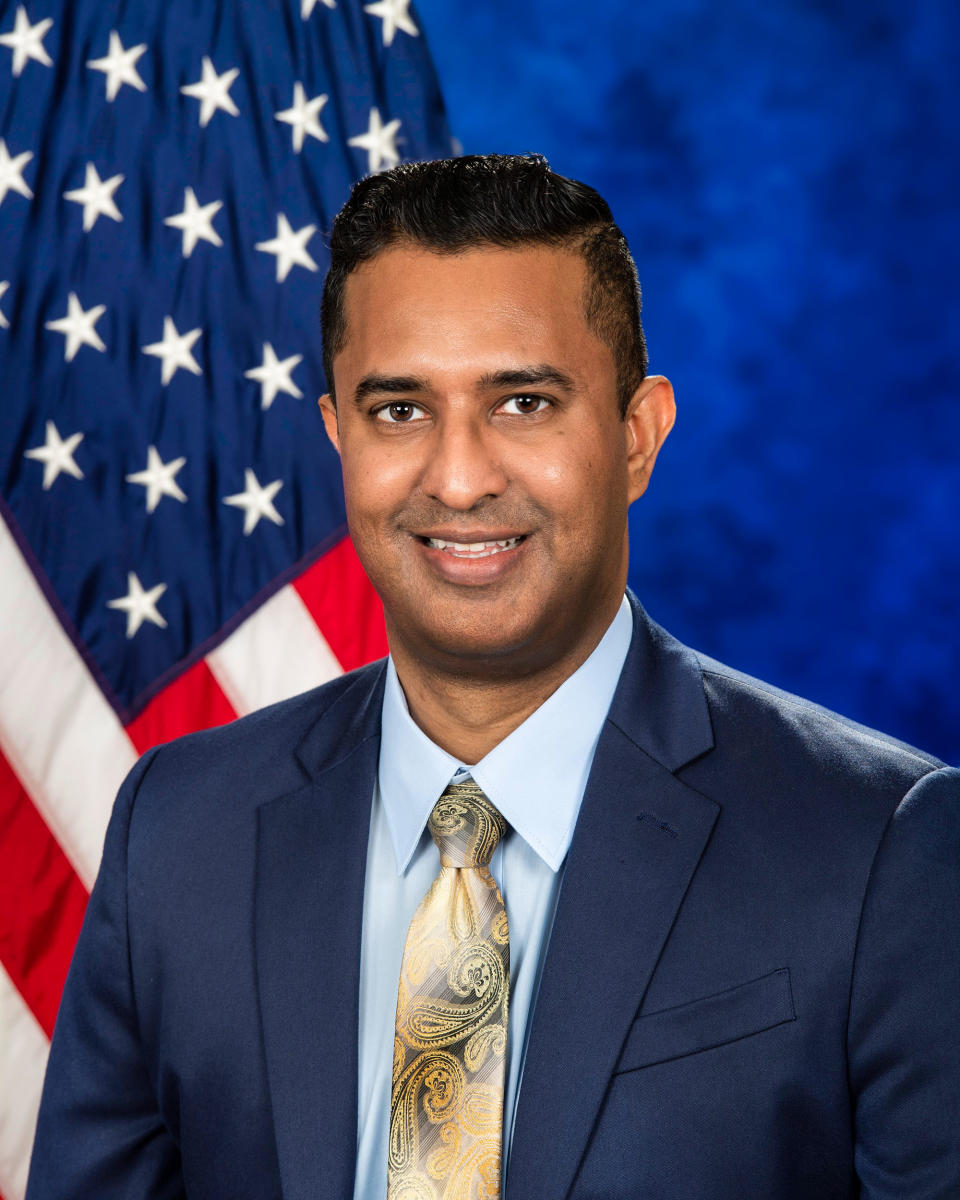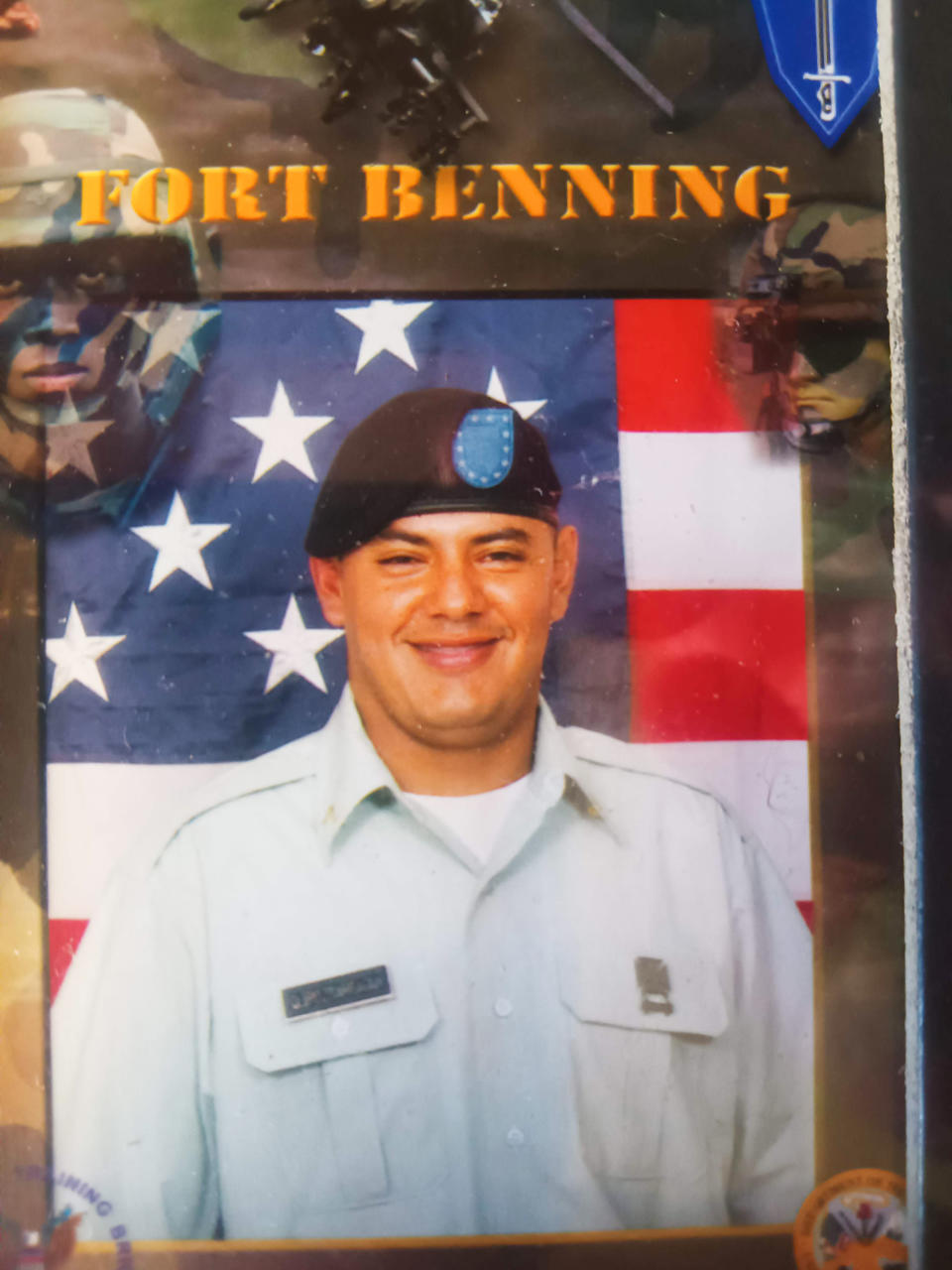Biden administration urging noncitizen veterans to naturalize, avoid deportation
- Oops!Something went wrong.Please try again later.
The U.S. government doesn't know exactly how many noncitizen military veterans it has kicked out of the country. A Biden administration official said he wants to keep the number from growing.
The Department of Veterans Affairs began work Monday contacting 123,983 military veterans who are not U.S. citizens about how to become citizens, said Saif Khan, an adviser to the VA's general counsel and a naturalized citizen.
The Department of Defense recently provided to the VA those individuals' names and information. They are people who were not citizens when they left the military between 2001 and as recently as April.
"This way we can make sure our veterans who are transitioning have information to enable them to have all the benefits they will gain to become a U.S. citizen by naturalizing," Khan said.

“I want my brother and sister veterans to have the same opportunities that I had when I deployed,” said Khan, who was a legal resident when he joined the military.
The VA plans to make multiple attempts to reach the veterans through phone and email in timed intervals — at 90 days, 180 days and 365 days after the person separates from military service, Khan said.
Khan sees the outreach as working on the front end of the problem of deportations of veterans, while other efforts are being made to return those already removed from the country.
President Joe Biden last summer began trying to address the many veterans who have been deported after serving time for crimes. A person can be a legal permanent resident and serve in the military, but legal permanent residents also can be deported under a 1996 immigration law signed by then-President Bill Clinton.
Absent legislation or an executive order mandating the deported veterans' return, the administration has used immigration procedures to allow some deported veterans to return and has restored veterans benefits to those deported.
'I was serving the country'
Juan Quiroz, 43, re-entered the United States on Wednesday at the San Ysidro, California, port of entry after nine years in Mexico. He then flew home to St. Louis, rejoining his wife, two children and other family members.
A U.S. Army veteran, Quiroz had trained soldiers to prepare for combat. He was deported after three years of incarceration on convictions on drug charges, he said. He joined the military at 24.
He was granted "humanitarian parole" to return to the U.S. because his wife is ill, he said.She had three brain surgeries to deal with blood clots while he was in prison and has had multiple side effects from medications.
While Quiroz was in Mexico, his father died. He was denied a chance to return to the U.S. for the burial. Quiroz said he never thought of himself as not an American citizen, so it never crossed his mind to pursue naturalization. Supervisors did not bring it up, he said.
"I never thought I was going to get deported," Quiroz told NBC News. "I hardly remember getting here. I grew up here. I had two children born in the U.S. I was serving the country. My entire family spoke English at home."
For part of his time in Mexico, he lived in his grandparents' home in his birthplace of Zamora, in Michoacán. But he said his time in exile was scary and hard, he said. People knew by his poor Spanish and accent that he was from the U.S., he said.

"You couldn't tell people you were prior military, because cartels would pick you up because of your prior military training," he said.
When he learned his VA benefits were restored, he used his GI Bill benefits to attend college in Mexico. An organization that helps deported veterans held a meeting in Guadalajara, where he met his attorney who helped him return to the U.S., he said.
Now that he’s back in the U.S., Quiroz said he was working with his attorney to pursue citizenship.
Last month, Immigration and Customs Enforcement said military service of a noncitizen and their immediate family members will be taken into account when deciding whether to deport someone or take other immigration enforcement measures.
Armed forces recruits were previously able to get through their naturalization process while in basic training with immigration offices in place at some military installations, but the Trump administration shut down that program.
The American Civil Liberties Union won a class-action lawsuit in 2020 that struck down restrictions that the Trump administration implemented for noncitizen recruits to get citizenship. But the Army Times reported in April that recruits still were running into problems getting naturalizations done.
The VA's outreach on naturalization will become part of an existing program, Solid Start, that assists all recently separated veterans with accessing benefits and with problems they may be facing as they transition to civilian life.
"It really is great to be an immigrant and working on this here," said Khan, who came to the U.S. from India when he was 11. "It has a special significance and is near and dear to my heart."
Khan joined the military directly after high school and was being deployed to Iraq. He said he saw reports about Marine Lance Cpl. José Gutiérrez, a legal permanent resident who was one of the first servicemen killed in combat in Iraq, and decided he needed to speed up the citizenship process that his parents had started for him.
Before starting up the new outreach program, Khan said he visited with deported veterans and recently repatriated veterans.
Those still deported spoke with him of their separations from families and problems they face.
“The recently repatriated, I could see how happy they were, and I saw the sadness of the veterans who are in Mexico, still waiting,” he said.
Last year, the VA launched an online portal for deported veterans to use to apply for return to the U.S. In a recent hearing, a Department of Homeland Security official said there have been about 144 inquiries through the portal regarding returning to the U.S.
Rep. Zoe Lofgren, chair of the House Judiciary Committee's Subcommittee on Immigration and Citizenship, said of those 144 who inquired, only seven were under 40 years old. Most had committed drug offenses, and some had no criminal offenses. All but two of the convictions were more than five years old, and 108 were more than 10 years old, she said.
"The real question before us is whether someone who's volunteered to serve their country in the U.S. military who gets out and messes up should, in addition to paying the penalty under the criminal law for messing up, also be expelled from the United States," Lofgren said in the June 29 hearing.
Although the Biden administration has restored benefits to veterans, many have to travel long distances at their own cost to try to use them for health care. Many have low incomes because they earn very little across the border, and not all can access the portal or have access to legal services to help them navigate the process.
Lorena Munga, president of Repatriate Our Patriots, cheered the increased outreach for veterans as a step forward in supporting immigrant veterans. Ultimately, she said, the group wants to see all deported veterans "recognized as part of our country and as deserving of the privileges that come with being part of our country."
The VA is also working to locate incarcerated veterans, including those who are not citizens, so they can get VA services, including naturalization help, when they are released.
Khan said he hopes the number of veterans coming into the VA system in the future will be reduced over time because they will have naturalized while in the military.
"We are going to be continuing our efforts anyway," he said, "to make sure no one falls through the cracks."
Follow NBC Latino on Facebook, Twitter and Instagram.

